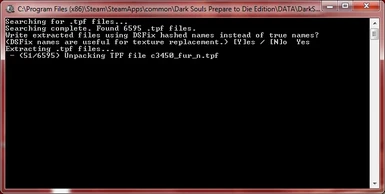File information
Created by
HotPocketRemixUploaded by
HotPocketRemixVirus scan
Documentation
Readme
View as plain text
# Dark Souls Texture Extractor
Unpacks Dark Souls 1 texture files from the unpacked game files, bypassing
DSFix's texture dump feature to grab all textures all at once. This means
the user doesn't have to visit every area, equip every item, etc. to dump
their textures; the game does not need to even be started.
Instructions:
Note: The Dark Souls 1 data directory DATA is usually located at
C:\Program Files (x86)\Steam\SteamApps\common\Dark Souls Prepare to Die Edition\DATA,
but it may be in a different location depending on your Steam installation.
Before beginning, make sure you have at least 10GB of free hard-disk space and 1GB of
available RAM to run UDSFM, and 2 additional GB of free hard-disk space for the texture files.
* If you have not done so already, use UnpackDarkSoulsForModding (found at www.nexusmods.com/darksouls/mods/1304) to unpack your Dark Souls files.
**Important Note**: Many texture files are inside the *bnd files. To make the contents of these files available to the unpacker,
you **must** answer "No" when UDSFM asks if you want to delete temporary files.
* Place DarkSoulsTextureExtractor.exe and superfasthash.dll in your DATA directory.
* Run DarkSoulsTextureExtractor.exe by double-clicking on it. A command prompt windows should appear.
* Do not close the window until the prompt indicates that the process has completed. Make sure you read any prompts carefully before answering.
Once the tool completes, you may delete DarkSoulsTextureExtractor.exe and superfasthash.dll from DATA.
The output files are placed in DATA\unpacked-textures and are grouped into three sub-directories,
"textures" for plain texture files,
"normals" for normal maps, and
"speculars" for specular maps.
These classifications are based on the true file name (that is, the name of the texture file
as it appears in the unpacked files) and so is not guaranteed to be 100% accurate.
Technical Notes:
The distributed library superfasthash is compiled C implementing the SuperFastHash hashing
algorithm that DSFix uses to name its texture files. This is implemented in C to provide
a significant speed boost over a pure Python implementation.










